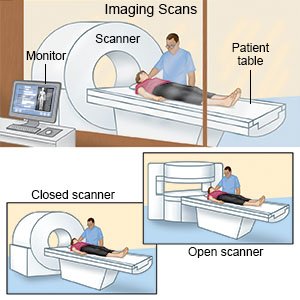Positron Emission Tomography of the Chest
Medically reviewed by Drugs.com. Last updated on Jul 7, 2024.
AMBULATORY CARE:
A positron emission tomography (PET) scan
is used to take pictures of your chest. A small amount of radiation, called tracer, is put into your body before the PET scan. The tracer shows how chemicals, such as glucose (sugar), are working in your tissues. A PET scan of your chest will show the blood flow through your heart. A PET scan may show an abnormal growth, such as a tumor. It may be used to show if cancer has spread. A PET scan may show disease or damage to your chest, lungs, heart, or esophagus.
How do I prepare for a PET scan?
- Tell your healthcare provider about all medicines you currently take. He or she will tell you if you need to stop any medicine for the test, and when to stop. He or she will tell you which medicines to take or not take on the day of your test.
- If you are a woman, tell your healthcare provider if you are pregnant or breastfeeding.
- Take only the medicines your healthcare provider told you to take.
- You may need blood tests before your PET scan.
- Your provider will tell you if you need to stop eating or drinking a certain time before the test. He or she may tell you not to eat or drink anything except water for 4 to 6 hours before your scan.
What will happen during the PET scan:
- Tracer will be put in your IV. You will need to remain as still as possible for 1 hour as the tracer moves through your body. Healthcare providers may give you sedative medicine through your IV to help you feel calm and relaxed. You will lie on your back on a table attached to the PET scan machine. When the PET scan begins, the table will move through a large hole into the middle of the machine.
- You will need to lie still while the scan is being done. Healthcare providers may ask you to change positions between pictures. A camera will take pictures of your chest. The pictures will appear on a monitor. When the PET scan is over, the table will move out of the machine.
 |
What to expect after a PET scan:
- Do not get off the table until healthcare providers say it is okay. You may be able to go home after the test is complete. If you are staying in the hospital, you will be taken to a room.
- If you are breastfeeding, do not breastfeed your child right after the test. Ask your healthcare provider how long to wait to let the tracer leave your body.
Risks of a PET scan of the chest:
The radiation from the scan may increase your risk of cancer. Small growths in your body may not be found with a PET scan. If the results are not clear, you may need another PET scan. If you are pregnant or breastfeeding, a PET scan may harm your baby.
Call your local emergency number (911 in the US) if:
- You have any of the following signs of a heart attack:
- Squeezing, pressure, or pain in your chest
- You may also have any of the following:
- Discomfort or pain in your back, neck, jaw, stomach, or arm
- Shortness of breath
- Nausea or vomiting
- Lightheadedness or a sudden cold sweat
- You have nausea or are sweating for no reason.
- You have trouble breathing.
- You cough up blood.
Call your doctor if:
- You feel dizzy.
- You have questions or concerns about your PET scan, condition, or care.
Drink liquids as directed:
You may need to drink extra liquids after your PET scan. This will help flush the tracer out of your body. Ask your healthcare provider how much liquid to drink each day and which liquids are best for you.
Follow up with your doctor as directed:
You may need to return to go over the results of your PET scan. Write down your questions so you remember to ask them during your visits.
© Copyright Merative 2024 Information is for End User's use only and may not be sold, redistributed or otherwise used for commercial purposes.
The above information is an educational aid only. It is not intended as medical advice for individual conditions or treatments. Talk to your doctor, nurse or pharmacist before following any medical regimen to see if it is safe and effective for you.
Further information
Always consult your healthcare provider to ensure the information displayed on this page applies to your personal circumstances.
